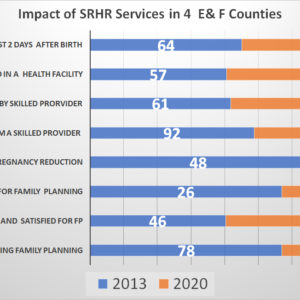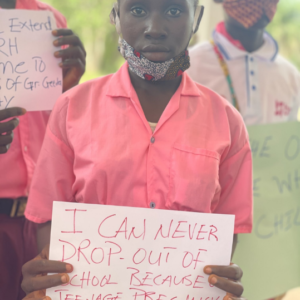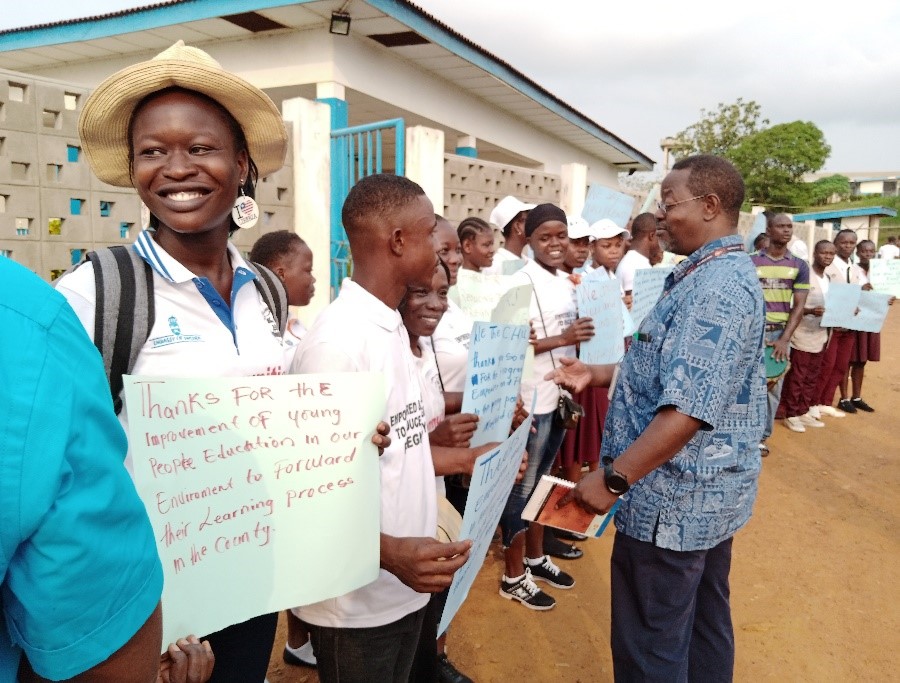PHOTO: The Author, Dr. Bannet Ndyanabangi with a group of adolescents who have gathered to welcome him and a team from the Embassy of Sweden on a joint field mission to Southeastern Liberia.
Adolescents and young people in Liberia matter. They matter because they make up an unprecedented 63 percent of the approximate 4.6 million population and because they are the shapers and leaders of the country’s future. They matter because they have inherent human rights that must be fulfilled.
Yet, in a world of adult concerns, adolescents and young people are often overlooked. This tendency cries out for urgent correction because it imperils youth as well as economies and societies at large.
Importantly, adolescence is a decisive age for boys and girls around the world. What transpires during an adolescent’s life especially a girl, shapes the direction of her life and that of her family. For many girls in Liberia, the mere onset of puberty that occurs during adolescence marks a time of heightened vulnerability—to leaving school, child marriage, early pregnancy, HIV, sexual exploitation, coercion, and violence.
Adolescents and young girls are less likely than older women to access sexual and reproductive health care, including modern contraception and skilled assistance during pregnancy and childbirth. Many are underprivileged with limited knowledge about sexual and reproductive health issues. They cannot also make independent decisions about their health. Moreover, they often do not have access to health care that meets their specific needs.
Young people are our future
The largest global youth population in human history will have a profound effect on every aspect of our common future and can create a better world for all. The effect can be overwhelmingly positive if young people can develop their capabilities, have access to education and health, including sexual and reproductive health, and find opportunities to fulfill the promise of their lives through, for example, decent employment.
Obstacles that threaten a generation
Despite evidence that the Government of Liberia is paying greater attention to youth through public policy initiatives, young people as a whole still confront many obstacles that keep them from safely moving into adulthood and entering the workforce. Many of them do not go to school, or if they do, they miss even minimum benchmarks for learning.
Sexual and reproductive health and reproductive rights—which are pivotal to young people’s realization of their full potential—are limited because of large gaps in information and services. Adolescents, in particular, have less access to contraception, and STDs testing, counseling, and care.
Gender norms penalize young women by depriving them of equal opportunities for education, employment, and health care, and leaving them more vulnerable to human rights violations. Social pressures, in general, can be a strong impediment, such as by encouraging young girls to drop out of school to carry activities such as street vending to cater for family needs, putting them at further risks including sexual and gender based violence.
These obstacles can be complex, but they can all be overcome. Regardless of their stage of development, Liberia bears the responsibility to uphold the rights of adolescents and youth and help them establish foundations for their lives.
This includes equipping them with high-quality, relevant education, and comprehensive health care, encompassing all aspects of sexual and reproductive health. Youth need opportunities to earn a living and to participate in decisions that affect them. Given the disparities that persist in all societies, special efforts should reach groups marginalized on multiple fronts, such as age, gender, and ethnicity.
Making these investments in youth is the right thing to do. It is also smart, for many reasons.
For example, investing in youth can enable developing countries including Liberia to
reap a demographic dividend, which can help reduce poverty and raise living standards.
Many of the countries with the largest portions of youth today are among the poorest in the world, but they are also on the cusp of a demographic transition that can yield the dividend. Transition begins as fertility and death rates start to fall, leaving fewer dependents. More people, proportionally, are in the workforce. The dividend comes as resources are freed for economic development and greater per-capita spending on higher quality health and education services. Economic growth takes off. A virtuous cycle begins where capabilities and opportunities continuously expand.
Making the most of the demographic dividend depends heavily on appropriate public policy choices and investments made before or during the demographic transition, when a country moves from high death and fertility to low death and fertility.
Acting now to secure a demographic dividend
We know what works; and it has worked-investing in the sexual reproductive health of adolescents and young people, especially girls, is the surest investment a country can make for its sustainable future.
The provision of a gender-sensitive, age-appropriate, and life skills-based Comprehensive Sexuality Education (CSE) to both in and out of school adolescents and youth holds the key.
Since June 2016, UNFPA has been directly supporting the Government of Liberia through evidence-based advocacy for an enabling policy and program environment for young people to access sexual reproductive health and family planning information and services; gender-sensitive, age-appropriate, and life skills-based Comprehensive Sexuality Education (CSE) delivered to both in and out of school adolescents; community behavior change communication; sensitizing communities and awareness creation for community-driven action on promoting sexual reproductive health and family planning information and services for the very young adolescent; and capacity building of institutions and harmonized community structures to deliver quality youth-friendly sexual and reproductive health services including public health facilities, schools, existing youth centers, community safe spaces, and outreach posts especially in the Southeast (Grand Gedeh, River Gee, Maryland, Grand Kru) and Sinoe which was added in March 2021.
The results of the first three years of this program, which is funded by the Embassy of Sweden have been tremendous with considerably increased retention in the number of girls in school, and reductions in teenage pregnancies as well as maternal and newborn deaths. According to the Liberia Demographic and Health Survey 2019-20, this reduction in teenage pregnancies is at 45 percent.

Everywhere we went in this country, whether it was urban Montserrado or the remotest part of River Gee, the adolescents and young people’s aspirations and messages remained the same-opportunities that would allow them to become responsible and productive citizens of tomorrow.
While we may be able to celebrate these results coming out of Grand Gedeh, River Gee, Maryland, Grand Kru counties, there is a dire need to ensure that every boy and girl is provided the same opportunity to make informed decisions when it comes to his or her sexual and reproductive health.
On one of our many field visits in March this year, we met a group of adolescents in Fish Town, River Gee County who were so fascinated with the services they receive through the Youth Friendly Centers in the county. According to one of the adolescent girls, she would credit her ability to remain in school until Grade 12 to her access to sexual and reproductive health information and services available through her school health club and the youth-friendly center respectively. In her own words, she has been able to avoid making the same mistakes as her two elder sisters who had to drop out of school as a result of unplanned pregnancies. We wonder how many more such testimonies we would have if the same opportunity is provided to every boy and girl throughout the country.
The little investment we make today towards ensuring that girls go to and stay in school can have a tremendous impact on the future of our society.

Now is the time for Liberia to intensify investment in the health, safety, and education of its adolescents and young people. Putting young people at the front and center of sustainable development is both urgent and non-negotiable. Prioritizing and investing in young people is of the utmost importance as it is the only way Liberia will meet its development agenda.
UNFPA, the United Nations Population Fund remains committed to facilitating and accelerating efforts to achieve the ‘Three Zeros’ of ending unmet needs for family planning; ending preventable maternal death, and ending gender-based violence and harmful practices in Liberia.
Together, we can deliver a world where every pregnancy is wanted, every childbirth is safe, and every young person’s potential is fulfilled.
About the Author:
Dr. Bannet Ndyanabangi, is the outgoing UNFPA Country Representative to Liberia (March 2019 – 07 August 2021).

